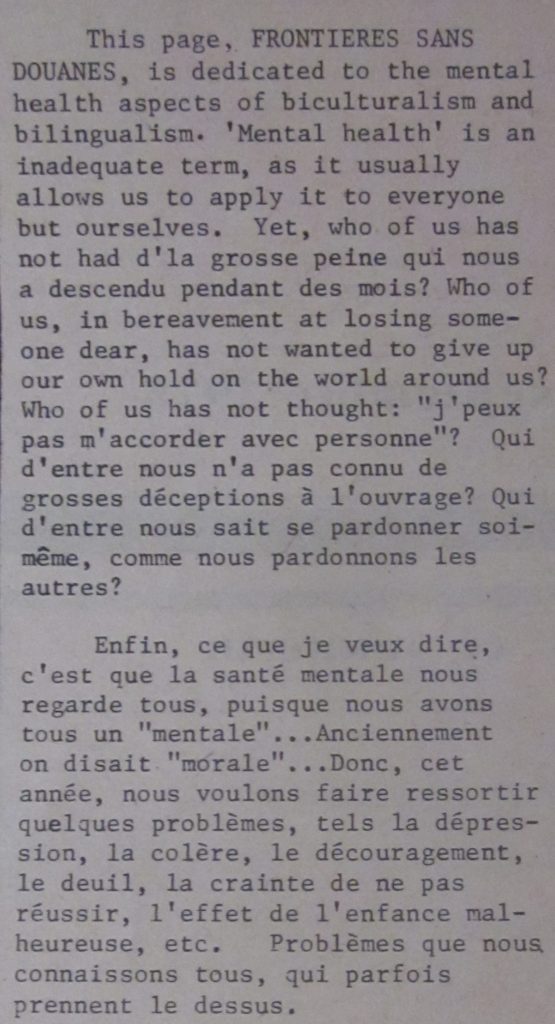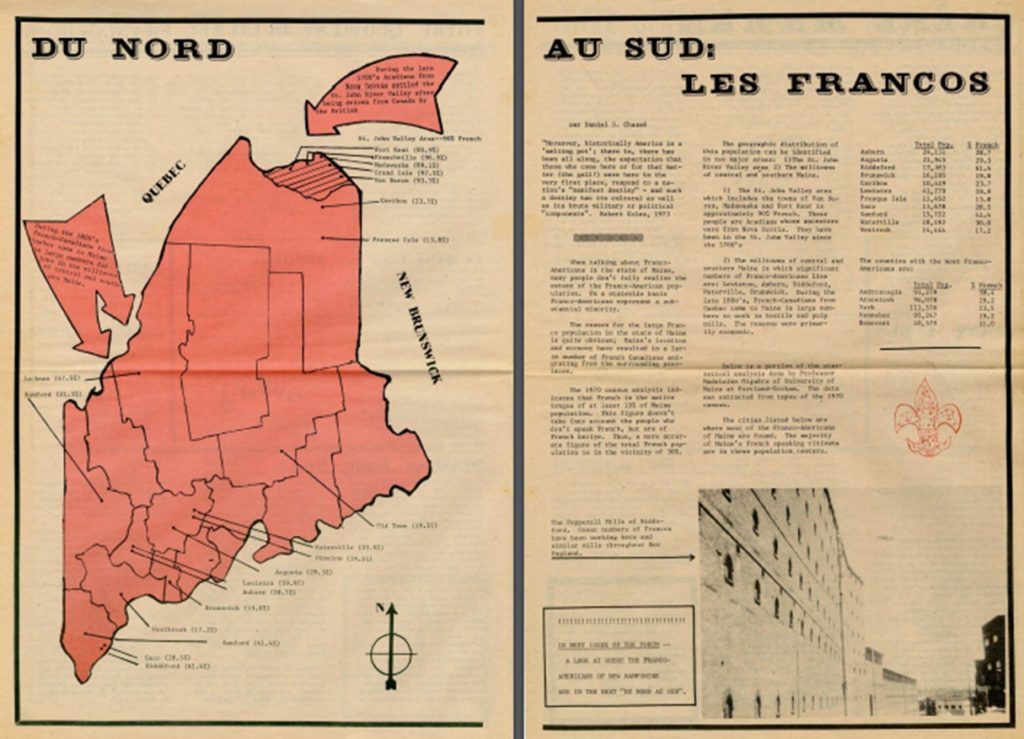From Survivance to Fulfillment
As promised last week, this post begins a month-long journey into the pages of Le Forum, a product of the FAROG and later the Franco-American Centre in Orono, Maine. Again, a word of caution is in order: this is only one of many sources for the period at hand. We cannot take the Le Forum as a perfect or comprehensive representation of the Franco community’s concerns and sentiments. Nevertheless, it hints at the important—and vigorous—debates of the day and ways in which we might approach recent Franco-American history.
During the past nine months, we have evolved into a real newspaper, with pictures no less. In the process we have tried to provide a source of information about Franco-Americans in the 1970’s. We have hoped to create the beginnings of a communication network within our disparate Franco-American community. And, we have tried to exchange ideas for the benefit of all those involved, by blood, marriage, or love, with Franco-American life.
Our achievements have perhaps fallen short of our objectives, but the intention persists and the struggle goes on. Oddly enough we have a poster in the office which reads: ‘F.A.R.O.G. is an underdeveloped program as defined by the gap between its aspirations and its resources.’
– Editor Celeste Roberge, May 1975
Three years after the creation of the Franco-American Resource Opportunity Group, its outlet was a little engine with a small budget and high hopes. Roberge, Yvon Labbé, and their acolytes had already achieved a great deal to ensure the visibility of the fait français in Maine. The road to recognition and legitimacy was a long one, however.
A new political age was at hand in Maine, with recent legislation restoring bilingual education and the appointment under Governor Ken Curtis of Armand Dufresne as the state’s chief justice. At a local level, Omer Picard wrote of efforts to promote French education in northern Maine. Irene Simano discussed Project FACTS, a televised early childhood education program, which enabled participants to evaluate self-esteem in Franco-Americans. In “Un coup d’oeil sur FAROG,” Labbé attested to the hard work being done at the University of Maine for the revitalization of French-Canadian culture. There ought to be no question, he stated in the fall of 1975, that one could be a good American citizen and a francophone.
That only meant so much after decades of marginalization and discrimination. Franco-Americans youths were contending with that heavy legacy and what they perceived to be the failures of traditional elites. The FAROG Forum of the 1970s reflected growing ethnic awareness, a democratization of the Franco cultural project, and a search for allies and resources.

One of those allies proved to be the University of Maine’s James Muro, then dean of the College of Education. “I’d love this place to be a center in the U.S. for Franco-American everything,” Muro explained (presciently) to FAROG members. “Curriculum development, etc. I would like to see a series of offices, like a center, an institute.” In fact, in FAROG’s early years, much of the support would come from education faculty, with two courses focusing on the Franco-American experience.
Still much more a newspaper than a magazine, the Forum included papers written for one of these courses on the education of Franco-Americans. Nicole Cécile Collin’s work traced the history of resistance to Anglo-Protestant influence, a history that she had internalized and that blocked the full expression of her identity. Resistance was, for Collin, a quintessential part of the Franco-American identity. The decline of traditional institutions like the Church and parish schools meant that the struggle had become individualized. “In order to arrive at a dynamic, creative living awareness and definition of Franco-American culture and self-identity,” she wrote, “I must get beyond this resistance. To redefine it so I can live and have enjoyment and space to grow.”
In a later issue, Irene Simano shared a powerful, heartfelt reflection under the telling title, “La Survivance Is Not Enough.” “Even now,” she explained,
it seems ironic to speak about change when referring to the people of a culture whose main concern has been continuity, traditions, la survivance. Furthermore, it seems strange to speak about change in a positive manner and devoid of the defensiveness which characterizes the speech of many Franco-Americans when they bemoan the rapid rate of assimilation among the young. For so long, the criteria for the retention of true Franco American credentials have remained elusive for the young, because these credentials have been strictly tied to conformity, traditions (which are sometimes oppressive, not liberating) and la survivance. The answer to the question of what is a Franco American has traditionally followed a set pattern of ‘speaks French, is a Catholic, follows certain rituals and traditions, most of which are Church oriented, has a non-anglicized surname.[’]
That, Simano explained, may have been fine in 1875—but no longer. Surely there was another way. “Somewhere between the land of the petrified forest and the acres of assimilation lies the kingdom of the possible,” she stated. She hinted at the torrent of change known as the Quiet Revolution in Quebec and activism in the African-American community; even the Catholic Church was changing! The time had come to move from survivance—“defensive, archaic and destructive of vital energy”—to fulfillment.
Many contributions attested to the personal quest for self-confidence and a healthy, “normal” Franco-American identity. The Forum was at the vanguard of mental health awareness with a new column dedicated to issues pertaining to the mental well-being of francophones, no small step forward in 1975.
As for democratization, Roberge and Forum correspondents together expressed a desire to hear more voices. Youths could at last be heard in their own words. The writing of Collin and Simano and the leadership of Roberge reflected the essential role played by women in both the FAROG and its publication. There was also a desire to reach out to Francos in other states. Appropriately, one series titled “Du nord au sud” provided the lay of Franco-American communities in the New England states, including statistics and history. The Francos were significant—they simply had to recognize their significance.

On a lighter note reflecting its conversational tone, the paper regularly featured quizzes that were really inside jokes. It is likely that these short tests, appearing under “Votre quotient intellectuel francophone,” would only make sense to speakers of a certain colloquial French. The answers became increasingly obscure over time. In September 1975, one question was:
Péter de la broue =
- a. déformation physiologique qui entraîne beaucoup d’ennui[s]
- b. procédé par lequel on fabrique de la bière chez soi
- c. action de couvrir la réalité d’un vernis loquace
(Since an English translation would be at best imperfect, we might understand this as asking the meaning of “blowing hot air.”)
The language issue was also a matter of serious debate in the pages of Le Forum. One clergyman from the Madawaska region denounced the paper’s style; in his view, the writing “sent le chantier,” i.e. it had a whiff of the logging camp on account of the colloquial French and critiques of the Catholic Church. (Another correspondent issued a blunt “Stop printing.”) On the other hand, Don Dugas of the University of Massachusetts defended the French-Canadian dialect in the face of the Parisian. This was emblematic of the times. Scholars increasingly brought legitimacy to the ancestral tongue, such that younger generations might no longer feel ashamed to speak their parents’ French on account of its quality. That issue would linger for some time.
Next week: Le Forum in 1980: “Stand Up and Be Counted”
Hi Patrick … could you tell me what issues you referenced for the comments on language in the last paragraph of your blog ? I am interested in seeing what was said on this side of the border , and in what time period . The debate goes on today, but respect for the colloquial French is at an all time high in much of the Francophone world [ Quebec, Acadia, the western provinces ,Louisiana , and France.
Dear Henri: Thank you for your interest. In the May 1975 issue of the FAROG Forum (p. 10), Rev. Leo Hall of Van Buren made the reference to the logging camp and argued that this was a university publication that should use “correct French.” In the same number, Father Anselme Chiasson of New Brunswick also deplored this “français débraillé.” Dugas weighed in on the debate in the Nobember 1975 issue (pp. 8, 11) and defended the continued use of the distinctive, local French-Canadian dialect. I agree that this colloquial French has since received its “lettres de noblesse,” but in the 1970s and early 1980s, some elites – including teachers who had been trained in France and leaders inspired by attempts to de-anglicize Quebec French – continued to object to the alleged “langue du chantier.”